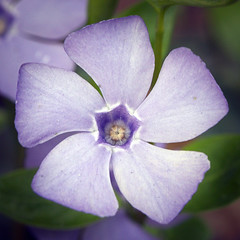Lesser Periwinkle
Lesser Periwinkle
Now naturalised in parts of Britain the lesser periwinkle is thought to have been introduced from Europe prior to 1600. It is pollinated by long-tongued bees and bee flies. Traditionally it has been planted in gardens as a symbol of good fortune and a happy marriage.
Herbalists used it as a tonic, a laxative and as a gargle; it was also prepared into ointment for skin conditions. Recently it has been important in providing the drug Vincamine, used in treating brain disorders.
On the authority of the Court of the Lord Lyon, periwinkle is recorded in the Public Register of All Arms and Bearings in Scotland and in the Matriculations of Arms of Chiefs as being the official plant badge of the Clan Hannay, originally from south west Scotland.
Perhaps the most famous Clan member was James Hannay (died 1661), the Dean of St Giles in Edinburgh. Reputedly, it was during one of his sermons on the 23 July 1637 that he became the target of a stool flung by one Jenny Geddes (c1600-c1660), a market trader, who was outraged at his use of the Anglican Book of Common Prayer for the first time in Scotland. The incident turned into a full scale riot which brought out the town guard and was depicted in a contemporary print.

Illustration of Jenny Geddes throwing the stool at Minister Hannay. From 'Witnesses for the Truth in the Church of Scotland' by W.P. Kennedy, 1843.
Public domain, taken from www.archive.org

